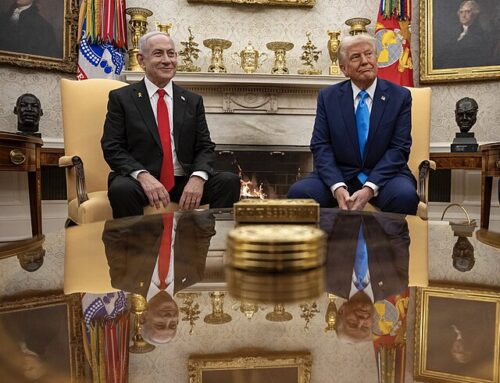A few weeks ago I participated in a panel on the two-state solution to the Israeli-Palestinian conflict. The panel consisted of a Palestinian-American spokesman and me. The two of us have been teamed up before although we tend not to disagree on very much…. Both of us support the two-state solution and, although there are differences between us on some of the issues that divide the two sides, they are minor compared to our agreement on the central issue.
…. Almost all the people in the audience were supporters of the two-state idea and view it as the only possible solution…. My Palestinian friend, on the other hand, was given a rough going over by some of his fellow Palestinians who oppose the two-state solution and favor Israel’s replacement by a state “for all the people who live there.”
At one point a Palestinian student – angered by my colleague’s insistence that the only alternative to two-states was a war that the Palestinians would lose – insisted that those advocating the one-state idea were not advocating violence. “We don’t support violence against Israelis. The state we envision can be established without violence.”
My friend laughed that off. “So you think the Knesset will decide one day to simply declare the State of Israel out of existence? And that will be that?”
He then added that, as the grandchild of people who were forced from their homes in Jerusalem in 1948, he was not prepared to wait forever for the opportunity to return to some part of Palestine, if he so chose. A West Bank/Gaza state with a capital in the Arab part of Jerusalem was the best he could hope for. That and peace with Israel. He cited polls that showed that the overwhelming majority of Palestinians living in the West Bank and Gaza agree with him. Click here for entire article.



A couple of months ago I wrote to Prof. Abunima of the University of Chicago, editor of “Electronic Intifada.” I proposed doing a piece on the lessons of power sharing in Northern Ireland and South Africa for Palestine based on my having authored two comparitive studies of the three conflicts. He was agreeable but didn’t like the result because I argued that the lessons did not support a one-state solution. He then proposed that I write a piece on under what circumstances power sharing could work. So I looked at all of the instances of power sharing in native-settler conflicts. I argued that power sharing was possible and feasible only when partition was not feasible. This meant that it wouldn’t work in the case of Israel-Palestine as the Zionists already had a state and were not about to give it up. The instances where power sharing had occured (Zimbabwe, South Africa, Northern Ireland) were not very promising.
In Zimbabwe-Rhodesia in 1978-79 power sharing was very one-sided in favor of the whites. A more balanced power sharing from 1980-87 led to the political isolation of the whites. Power sharing in South Africa after majority rule was largely voluntary rather than constitutional. In Northern Ireland power sharing has failed twice–in 1974 and in 1999-2002. Northern Ireland is about to undergo a third experiment in power sharing with the two extremes, rather than the center, in power this time. Abunima never published the article to my knowledge.
I guess successful power sharing is dependent on the demographics and who has the control of resources.
A couple of issues: one, is there enough land/resources left for a viable Palestinian state? (with access to outside markets NOT restricted by Israelis?) Another issue Israel has not successfully confronted is the demographics. Some folks are trying to confront this by ‘jettisoning’ their Arab dominated regions, but aside from the moral concerns that engenders, they also need to confront their ‘who is a Jew’ issue as well.
It’s a critical dynamic that is in flux I believe. Without an infusion of Jews from the diaspora who know very well who they are, I wonder what will happen to the concept of Judaism as a national political identity in the coming decades . Will a Jew just be someone who is not an Arab if Jews are so secular? Will it be just anyone who speaks Hebrew? (that’s weird! I’m Jewish and don’t) Where will non Jews and non Arabs fit into the mix? What will it mean to be a Jewish state? What will be the nature of the relationship between the diaspora Jewish community and those in Israel who identify as Jews?
I think all the discussion of power sharing between settler and native societies has to include answers to some of those questions. Of course, the situation is pretty explosive and I’m not sure we’ll get a chance to see it play out in the next couple of decades without excessive violence. In any case, it’s amazing to me that nearly 1/5th of population of (pre-67)Israel is Palestinian. If you compare that to the power of the non white population in America (African Americans are about 12% of our population and no Democrat has any hope of winning a presidential election without the African-American vote)one has to have immense respect for the power that the Palestinian citizens of Israel might wield, and it seems that they are becoming quite aware of that as well. Whatever the dreams of Jews of having a “Jewish” state, I think a lot of their power will inevitably be shared, with the results being whatever they might be. Seems better to arrive at that through negotiation rather than violence.